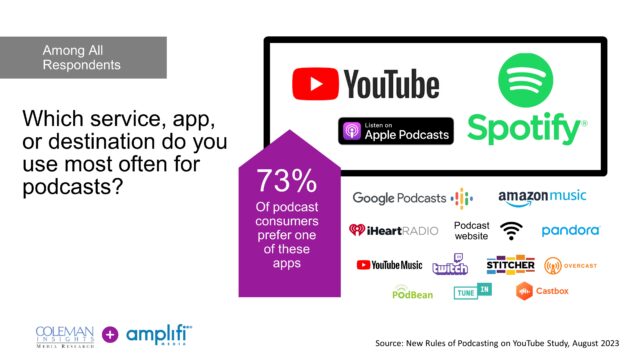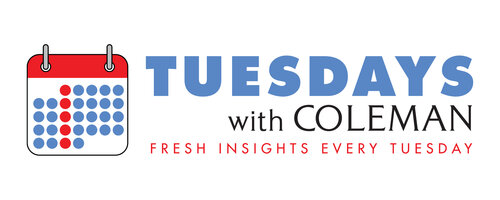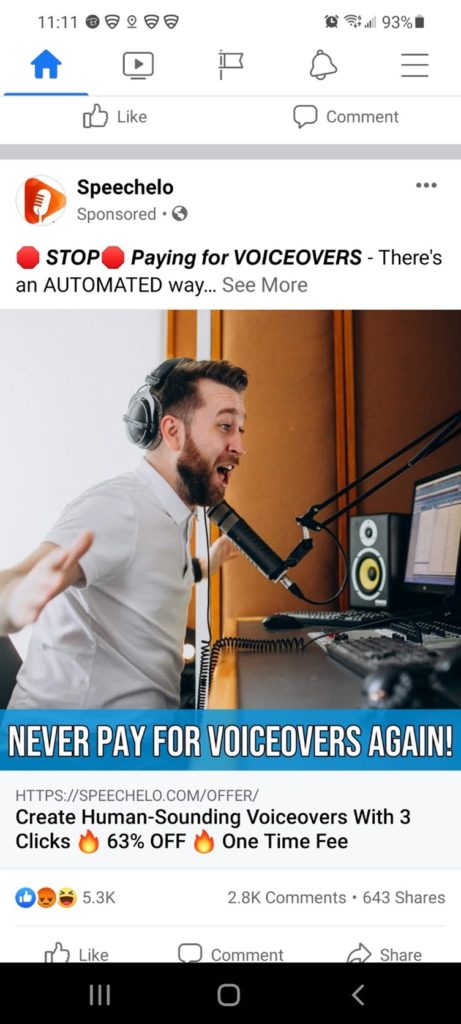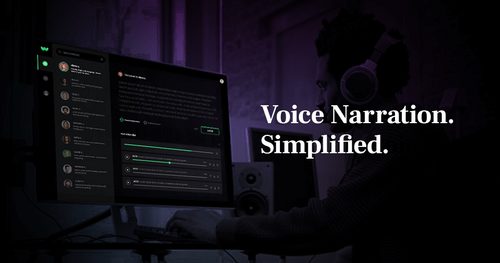
Podcast Movement Evolutions is an offshoot of the original Podcast Movement conference, the largest annual gathering of podcasters in the world. When first launched, Evolutions was more geared towards podcast creators, rather than the more industry professional-focused older sibling version. But, much like the medium itself, Spring’s Podcast Movement Evolutions, which took place last week in Los Angeles, has matured into an event nearly unrecognizable from Summer’s Podcast Movement.
Here are three takeaways from this year’s Podcast Movement Evolutions.
- YouTube, YouTube…how I love (hate) thee….
Ask consumers which platform they use the most for podcasts, as we did in our New Rules of Podcasting on YouTube study with Amplifi Media last August, and they will tell you YouTube, as the company shared in their Podcast Movement Evolutions keynote session Friday morning. Ask podcasters what they think of podcasting on YouTube, and well…it’s complicated.

There is one thing nearly every podcaster will agree on, and that’s YouTube’s massive value as a podcast promotional tool. Using trailers and clips on YouTube to market your podcast (as well as short-form platforms like Shorts, TikTok, and Reels) has been a tangible boon for many shows. Whether organic or paid (or a combination), YouTube has undeniable value for podcast discovery.
Where creators have far less consensus is regarding YouTube’s value for hosting entire podcast episodes. The frustration generally lies in YouTube’s methodology. Although, according to Podnews editor James Cridland in his annual podcasting report card, creators give YouTube high marks for its analytics, many are frustrated with its independent advertising ecosystem and lack of communication.
To paraphrase Audacy’s Head of Podcasts Jenna Weiss-Berman, “Half of me is in on YouTube and its role in the future of podcasting. The other half says they need to play in the same sandbox.”
YouTube is too important and valuable to the industry and used by consumers to be cast aside. It’s also fair to lay the burden on Google to adapt to the needs of the creator. (see: Spotify abandoning its “exclusive” platform model with Joe Rogan and other Spotify shows).
YouTube’s podcasting team shared some upcoming initiatives that address this. They also claimed they are working on more podcast-friendly algorithms to recommend more targeted content to the consumer For example, wouldn’t it be nice if when you play a podcast episode on YouTube, it recommends other episodes from that creator and similar podcasts rather than a slew of seemingly random videos from the YouTube galaxy? YouTube and its creators should be transparent, honest, and must work together to figure out the best way forward.
- Engagement is YouTube’s secret sauce
Consumers love the ability to comment on YouTube videos (and podcasts). Spotify’s Q&A feature now allows hosts to ask questions of their listeners, which can be sent to the creator privately, and creators can choose which comments to feature on the platform. Meanwhile, Apple, the third of the “Big 3” (with YouTube and Spotify), remains a one-way street.
On the surface, Apple adding listener engagement would be a big deal. But as Spotify surely knows from its video podcast initiative, (wait, Spotify has video podcasts? Yep…) just because you offer it doesn’t mean consumers will somehow magically find it, learn about it, or even want it from your brand.
So yes, if Apple were to add listener engagement, it would be interesting. But it doesn’t automatically mean it would be successful.
- We are legally obligated to mention AI in any conversation about podcasting
Last August, when Steve Goldstein and I presented that YouTube study in Denver, we had a conversation backstage before the keynote when we remarked, “Whoever figures out an easy podcast video service will do very well.” In a massively short period, Artificial Intelligence has swooped in to do just that. There are companies like Rizzle, which offer “no edit videos.” Or Audiencelift (formerly Trailergram), which encourages you to upload your podcast trailer and uses your preferred targeting location, Apple Podcasts category, and keywords from your ad description to show your podcast’s ad to new listeners.
Our friends at Blubrry, one of the original podcast hosting platforms, are at the forefront of differentiation and innovation, adding an AI assistant to help with promotion tools and highlight clip creation, and Vid2Pod, which plays the YouTube game in reverse…pulling in your YouTube playlist for universal audio distribution.
What a time to be alive.
But, as Blubrry CEO Todd Cochrane told me, “We still need to hear from real, authentic humans.”
This is both podcasting’s golden opportunity and the greatest obstacle in its next phase of growth. The industry should embrace new tools to spark more efficient and effective solutions. But it must also remember that authenticity is its greatest asset. Podcasters should want AI to help them be more efficient, but podcast consumers do not need AI to augment what they love about their favorite shows and hosts.
And finally, I’ll go back to what Todd says about hearing from those real live humans. Conducting real perceptual research with real podcast consumers is not a luxury. It is a necessity to grow brands and elevate this medium we love.





